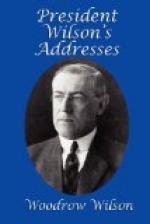peoples. These peoples do not really have revolutions.
What we call the American Revolution was only the
reaffirming of principles which were as precious in
the eyes of most Englishmen as they were in the eyes
of Washington, Hamilton, and Madison, but which had
been for a time and owing to peculiar circumstances,
neglected or contravened. Political development
in this family of nations does not, he maintains,
proceed by revolution, but by evolution. On all
these points his
Constitutional Government in the
United States is only a richer and more mature
statement and illustration of the ideas expressed
in his
Congressional Government. The main
thesis of his
George Washington is that the
great Virginian and first American was the truest
Englishman of his time, a modern Hampden or Eliot,
a Burke in action. Again and again he pays respect
to Chief Justice Marshall, who represented, in our
early history, the conception of law as something
in its breadth and majesty older and more sacred than
the decrees of any particular legislature, and yet
capable of being so interpreted as to accommodate
itself to progress. Mr. Wilson has from the beginning
been an admiring student of Burke. And if Burke
has been his study, Bagehot has been his schoolmaster.
The choice of book and teacher is significant.
Mere
Literature shows how Mr. Wilson revered them in
1896; his public life proves that he learned their
lessons well. In
An Old Master and Other Essays,
he had already borne witness to the genius of Adam
Smith and John Stuart Mill, who, as compared with
Continental writers, illustrate in the field of economics
the Anglo-Saxon spirit of respect for customs that
have grown by organic processes.
Mr. Wilson’s Division and Reunion is
an admirable treatment of a question upon which a
Southerner might have been expected to write as a
Southerner. He has discussed it as an American.
His well-known text-book The State, which has
been revised and frequently reprinted, discusses the
chief theories of the origin of government, describes
the administrative systems of Greece and Rome and
of the great nations of medieval and modern Europe
and of the United States, and treats in detail of
the functions and objects of government, with special
reference to law and its workings. His History
of the American People, though it contains many
passages of insight and has the charm that comes from
intense appreciation of details, is too diffuse and
repetitious. A great history should be a combination
of a chronicle and a treatise; it should be a record
of facts and at the same time a philosophical exposition
of an idea. Mr. Wilson’s five-volume work
is insufficient as a chronicle and too long for an
essay. Yet an essay it really is. Moreover,
unless I myself am blinded by prejudice, it makes too
much of the errors committed by our government in
the reconstruction period after the Civil War.
On the whole, with all their faults, the administrations




